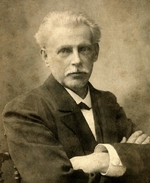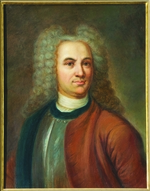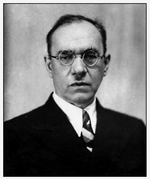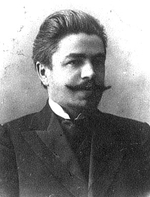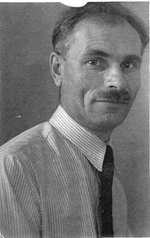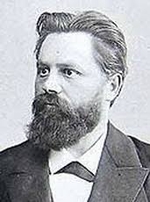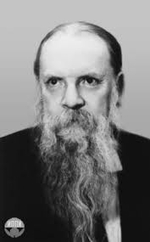Articles
Sumtsov Nickolay (1854–1922)
Sumtsov Nickolay (1854–1922) – folklorist, ethnographer, historian of literature.
He was born in St. Petersburg; he finished gymnasium in Kharkov and enrolled to the Kharkov University, at the Historical and Philological Faculty; he graduated from it in 1875. In the youth he was interested in folklore and made his first fixations of folk songs. In 1875-1877, he travelled to Germany, where he kept his studies. In 1878, at the Kharkov University, he defended his thesis ‘Prince V. F. Odoevsky’ and got an invitation to stay at the University as Ass. Docent in the history of Russian literature.
Read More
Supinsky Anton (1896–1957)
Supinsky Anton (1896–1957) – ethnographer.
In 1914 he was a teacher of a modest school in the Pinsky District of the Minsk Region. In 1915 he was mobilized. In 1916, he entered the Irkutsk Military School and a year after went to the front of the WWI. After the Revolution 1917, he was in the Red Army.
After demobilization, he returned to his teaching. In 1922, he graduated from the Minsk Teachers-Training Institute. In 1922-1928, he taught social discipline and supervised the 7-years secondary school. In 1928, he was sent to the State Academy of the History of Material Culture in Leningrad at the post-graduate courses. In 1930, he was Head of the Ethnographical Department of the State Russian Museum.
Read More
Takhtarev Constantine (1871‒1925)
Takhtarev Constantine (1871‒1925) – sociologist, historian, particularly historian of the primordial society.
He studied at the St. Petersburg University, and at the Military Medical Academy. In 1893, he participated in the revolutionary workers’ movement; he was a member of the Union of Struggle for the Liberation of the Working Class. In 1896, he was arrested; in 1897, he got freedom and went abroad. He was a member of the group ‘Liberation of Labour’, participated at the II Congress of the R.S.D.W.P. in London.
In Brussels he visited lectures on sociology by Prof. M. M. Kovalevsky. Under his influence, and that one of P. L. Lavrov, a colleague and friend of his father, T. got his interest in the history of the early forms of social organization, started to study ethnography and primordial religion on the base of museum artifacts and contemporary anthropological works.
Read More
Tatishchev Vasily (1686‒1750)
Tatishchev Vasily (1686‒1750) – historian, writer, geographer, economist, state person.
He studied at the Moscow Artillery and Engineering Scool under the supervision of General Ya. W. Bruce, participated in many military campaigns: Narva (1705), Poltava (1709), Prut (1711). In 1713-1714, he was in Germany for further education. In 1717, he visited Danzig on the order of Peter the Great to bring the picture ‘Last Judgment’ which was attributed to St Methodius – and T. proved that the attribution was wrong. In 1718, he participated in the preparation of the Alands Congress of Russia and Sweden. After it he served under Bruce, President of the Berg-Collegium. In 1720, he was sent to the Urals to develop mining. There he had a conflict with A. N. Demidov, who opposed to the foundation of state plants – as a result T. was under the trial, but he was justified.
Read More
Tikhomirov Mikhail (1893–1965)
Tikhomirov Mikhail (1893–1965) – historian, paleographer.
After finishing a commercial school in St. Petersburg with a golden medal, he enrolled at the Historical Department of the Historical and Philological Faculty of the Moscow University. In 1917, he graduated it with the final study ‘Pskov Riot of the Seventeenth Century: From the History of Struggle of Social Classes in Russia’ (publ. in 1919). Since October 1917, he was a trainee in extracurricular education at the Cultural-Enlightening Department of the Cooperative Union of Dmitrov; that he was instructor in local history, Head of the Museum of Local History of the town of Dmitrov (by Moscow). In 1919-1920, he taught paleography in the University of Nickolaev (Saratov). In 1921-1923, he taught at the University of Samara.
Read More
Titlinov Boris (1879–aft. 1944)
Titlinov Boris (1879–aft. 1944) – historian of religion, theoretician of the Renovationist Movement (Living Church).
He graduated from the Vyatka Spiritual Seminary in 1899, the St. Petersburg Spiritual Academy in 1904. In 1905, he defended his Master thesis in Theology ‘Government of Empress Anna Ioannovna in Its Relation to the Matters of Orthodox Church’. In 1910, he wrote his Doctor thesis in Ecclesiastic History ‘Ecclesiastic School in Russia in the Nineteenth Century’ for the St. Petersburg Spiritual Academy, but it was rejected because of negative reviews from hierarchs. In that work T. mentioned bad influence of ‘the monopoly of monks at the system of high appointments’ at the ecclesiastic (spiritual) schools in Russia; he stressed that usually those people became monks for their career purposes.
Read More
Tiumenev Aleksander (1880–1959)
Tiumenev Aleksander (1880–1959) – historian and orientalist (specialist in classical, Mycenologic, and Sumerian studies).
He was born in St. Petersburg; in 1904, he graduated from the Historical and Philological Faculty of the St. Petersburg University and started his work there. In 1928-1931, he was Researcher of the Leningrad Branch of the Communist Academy. In 1931-1938, he was Researcher of the State Academy of the History of Material Culture. Academician of the Ac. of Sc. of the U.S.S.R. (1932). He was awarded with the Order of Labour Red Banner (1945).
Read More
Tokarev Sergey (1899–1985)
Tokarev Sergey (1899–1985) – ethnographer, historian of ethnography, historian of religion.
In 1917, he started to work as a school teacher; in 1921, he enrolled at the Faculty of Social Studies of the Moscow University; in 1925, graduated from it.
He taught at the Communist Institute of the Workers of China named after Sun Yat-sen (later – the Communist University of the Workers of the east named after I. V. Stalin; it was subordinate to the Eastern Department of the Comintern). In 1927, T. became Researcher at the Central Museum of Ethnology; in 1932, he got there a position of Head of the Sector of the North. In parallel he worked at the Central Anti-Religious Museum (1929-1937).
Read More
Tokarsky Ardalion (1859–1901)
Tokarsky Ardalion (1859–1901) – Russian psychiatrist, one of the founders of experimental psychology in Russia.
He was born in the Saratov Province, in the Balanda Settlement (now Kalininsk); in 1880, he graduated from the First Saratov gymnasium and entered the University of Dorpat (Tartu); in 1881-1885, studied at the Medical Faculty of the Moscow University. After successful graduation, he got training at the psychiatric clinic of Moscow University; in 1889-1892, he had internship in Germany and France with the largest European doctors and psychologists of that time: G. Helmholtz, W. Wundt, J. M. Charcot, and I. Bernheim. In 1893, T. became Doctor of Medicine, having defended his thesis. Since 1895, Ass. Professor of the Medical Faculty and Head of the Laboratory of Nervous and Mental Diseases at the Moscow University.
Read More
Tolstoy Nikita (1923–1996)
Tolstoy Nikita (1923–1996) – linguist, folklorist, ethnographer, Academician of the Academy of Sciences of the U.S.S.R. (1987), Professor at the Moscow State University. The main sphere of interests: linguistics, Slavic philology, ethnolinguistics, paleoslavistics.
In 1941, he graduated from the 1st Russian-Serbian male gymnasium in Belgrade. In 1945, together with his parents, he came to the U.S.S.R. and entered the Philological Faculty of the Moscow State University, specialty ‘Bulgarian language’. His supervisor during the work on the diploma paper ‘The preposition of OD in the Macedonian language’ was a specialist in the Church historian (Old Believers), linguist, Slavist Academician V.V. Vinogradov.
Read More
Showing 301-310 of 351 items.

